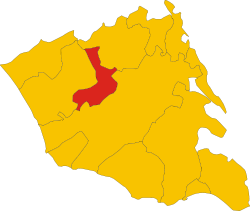
Syracuse is a historic city on the Italian island of Sicily, the capital of the Italian province of Syracuse. The city is notable for its rich Greek and Roman history, culture, amphitheatres, architecture, and as the birthplace and home of the pre-eminent mathematician and engineer Archimedes. This 2,700-year-old city played a key role in ancient times, when it was one of the major powers of the Mediterranean world. Syracuse is located in the southeast corner of the island of Sicily, next to the Gulf of Syracuse beside the Ionian Sea. It is situated in a drastic rise of land with 2,000 metres (6,600 ft) depths being close to the city offshore although the city itself is generally not so hilly in comparison.
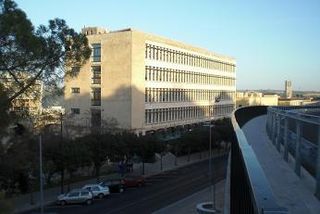
The province of Ragusa was a province in the autonomous region of Sicily, Italy, located in the southeast of the island. Following the abolition of the Sicilian provinces, it was replaced in 2015 by the free municipal consortium of Ragusa. Its capital is the city of Ragusa, Sicily, which is the most southerly provincial capital in Italy.
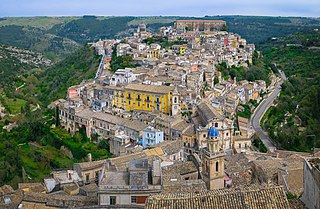
Ragusa is a city and comune in southern Italy. It is the capital of the province of Ragusa, on the island of Sicily, with 73,288 inhabitants in 2016. It is built on a wide limestone hill between two deep valleys, Cava San Leonardo and Cava Santa Domenica. Together with seven other cities in the Val di Noto, it is part of a UNESCO World Heritage Site.

Licata, formerly also Alicata, is a city and comune located on the south coast of Sicily, at the mouth of the Salso River, about midway between Agrigento and Gela. It is a major seaport developed at the turn of the twentieth century, shipping sulphur, the refining of which has made Licata the largest European exporting centre, and asphalt, and at times shipping cheese.

Sicilian Baroque is the distinctive form of Baroque architecture which evolved on the island of Sicily, off the southern coast of Italy, in the 17th and 18th centuries, when it was part of the Spanish Empire. The style is recognisable not only by its typical Baroque curves and flourishes, but also by distinctive grinning masks and putti and a particular flamboyance that has given Sicily a unique architectural identity.
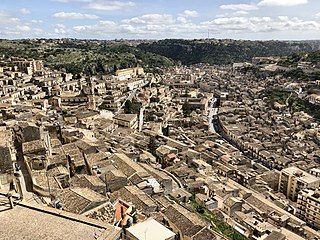
Modica is a city and comune of 54,456 inhabitants in the Province of Ragusa, Sicily, southern Italy. The city is situated in the Hyblaean Mountains.

Scicli is a town and municipality in the Province of Ragusa in the south east of Sicily, southern Italy. It is 25 kilometres (16 mi) from Ragusa, and 188 kilometres (117 mi) from Palermo, and has a population (2017) of 27,051. Alongside seven other cities in the Val di Noto, it has been listed as one of UNESCO's World Heritage Sites.

Nicosia is a comune (municipality) in the province of Enna, in the Italian region of Sicily. It is located at 720 metres above sea level, on a rocky massive culminating in four imposing hills. The origin of Nicosia is uncertain. Nicosia and Troina are the northernmost towns in the province of Enna. The vicinity was traditionally made up of salt mines and arable lands.

Chiaramonte Gulfi is a town and comune in the province of Ragusa, Sicily, southern Italy.
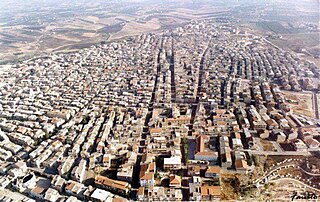
Campobello di Licata is a comune (municipality) in the Province of Agrigento in the Italian region Sicily, located about 110 kilometres (68 mi) southeast of Palermo and about 30 kilometres (19 mi) east of Agrigento.

Canicattì is a town and comune (municipality) in the Province of Agrigento in the Italian region Sicily, located about 90 kilometres (56 mi) southeast of Palermo and about 34 kilometres (21 mi) east of Agrigento. In 2016, it had a population of 35,698.
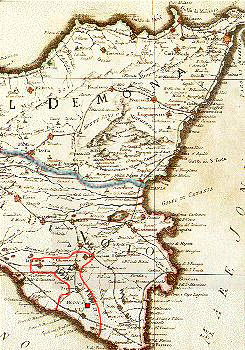
The County of Modica was a feudal territory within the Kingdom of Sicily from 1296 to 1812. Its capital was Modica, on the southern tip of the island, although the cities of Ragusa and Scicli housed some government offices for a period. Today it is perpetuated only as a title held by the head of the House of Alba, Carlos Fitz-James Stuart, 19th Duke of Alba.
Eccellenza Sicily is the regional Italian Eccellenza football division for clubs in Sicily. It is competed among 32 teams in two groups. The winners of the Groups are promoted to Serie D. The clubs that finish second also have the chance to gain promotion. They are entered into a national play-off that consists of two rounds.

The 1693 Sicily earthquake struck parts of southern Italy near Sicily, then a territory part of the Crown of Aragon by the Kings of Spain Calabria, and Malta on 11 January at around 21:00 local time. This earthquake was preceded by a damaging foreshock on 9 January. The main quake had an estimated magnitude of 7.4 on the moment magnitude scale, the most powerful in Italian recorded history, and a maximum intensity of XI (Extreme) on the Mercalli intensity scale, destroying at least 70 towns and cities, seriously affecting an area of 5,600 square kilometres (2,200 sq mi) and causing the death of about 60,000 people.

Comiso Airport "Pio La Torre", also known as Vincenzo Magliocco Airport, is an airport located in the town of Comiso in the Province of Ragusa, Sicily, Italy. The airport serves Comiso (5 km [3.1 mi]), Ragusa (15 km [9.3 mi]), Vittoria and Gela. It changed from military to civil use during 2005–2008. The airport was opened to commercial and general aviation 30 May 2013.

Kaukana, also spelled Caucana, is a hamlet (frazione) of Santa Croce Camerina, a municipality in the Province of Ragusa, Sicily, Italy. It is located a few hundred metres from Punta Secca and a few km from Marina di Ragusa.
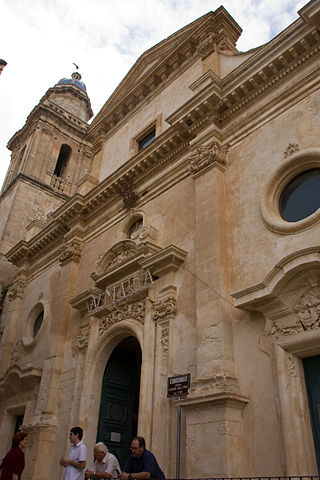
Santa Maria dell' Itria is a Baroque-style, Roman Catholic church located in the city of Ragusa, in southern Sicily, Italy.

The Sicilian Renaissance forms part of the wider currents of scholarly and artistic development known as the Italian Renaissance. Spreading from the movement's main centres in Florence, Rome and Naples, when Renaissance Classicism reached Sicily it fused with influences from local late medieval and International Gothic art and Flemish painting to form a distinctive hybrid. The 1460s is usually identified as the start of the development of this distinctive Renaissance on the island, marked by the presence of Antonello da Messina, Francesco Laurana and Domenico Gagini, all three of whom influenced each other, sometimes basing their studios in the same city at the same time.
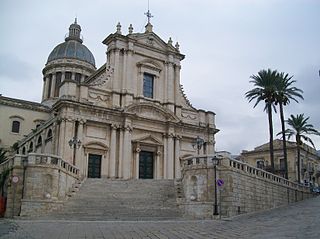
Chiesa di Maria Santissima Annuziata is a Roman Catholic parish and minor basilica church located in the city of Comiso, in the province of Ragusa, Italy. The church is dedicated to the Marian devotion of the Virgin of the Annunciation.

The Siracusa–Gela–Canicattì railway is a single-track line in Sicily, Italy managed by RFI. The route connects Syracuse on the Ionian side of Sicily to the Mediterranean side, crossing, with an east-west route, a number of large urban centers to Canicattì.
